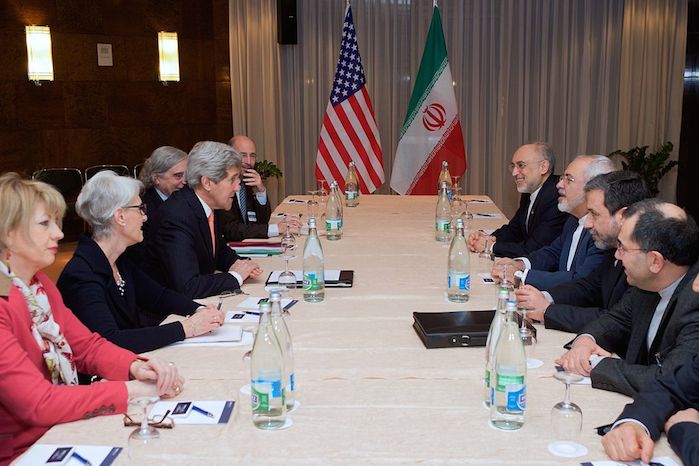There Is No ‘Better’ Deal Than the JCPOA

The Bloomberg editors never tire of giving terrible advice to everyone else about the nuclear deal:
With Trump’s policies doing little to curtail this behavior, Democratic candidates should seize the opportunity to push for a new deal. Rather than merely bringing the U.S. back into the JCPOA, they should insist on a broader, genuinely comprehensive bargain that fixes the defects in the original and takes into account Iran’s recent aggression.
Bloomberg’s editors keep declaring the JCPOA dead, but in spite of the administration’s efforts to kill it the other parties to the agreement refuse to let it die. They have urged European governments to abandon the deal, but Germany, France, and Britain pressed ahead and established the INSTEX workaround. As they have done once again, they have repeatedly called for a “better” or “new” deal that Iran would never agree to. Like other opponents of the nuclear deal, they seem to think that all that is required to obtain even more extensive concessions from Iran is sufficient pressure and the will to demand more. The deal’s opponents pretend that Iran can be forced into accepting things that their government believes to be contrary to their interests, but of course that isn’t possible. It isn’t credible to feign interest in negotiations with Iran while actively seeking the demise of the most significant diplomatic agreement with Iran. Iran hawks have often pretended that they were not opposed to diplomacy with Iran itself, but their actions and bad faith arguments prove that they are.
Hawks recoil from the compromise that diplomatic agreements require. They are almost never satisfied with the concessions our diplomats manage to secure, and they usually assume that the other government has outmaneuvered ours. Hawks never want to settle for the available agreement, but insist that there is always some “better,” “tougher” one waiting just over the horizon. In almost every case, this means that they think the other side should surrender and cede all of its rights and claims while demanding nothing from us. It is never realistic, it is never acceptable to the other government, and unsurprisingly the “better” deal never materializes because the other side has no reason to negotiate with unreasonable maximalists. We have seen this with every arms control and nonproliferation agreement over the decades. Thirty years ago, hard-liners denounced Reagan for appeasing the Soviets with the INF Treaty, which also happened to be the most lopsidedly pro-American arms control treaty ever negotiated. The content of these agreements doesn’t matter to them, and the “flaws” and “defects” that hawks say they want to fix are usually necessary to ensure that the agreement is acceptable to all parties. When hawks say they want to “fix” the “defects” in the JCPOA, they mean they want to destroy the agreement and replace it with nothing.
Unless the U.S. rejoins the agreement as it is and begins honoring our side of the bargain, Iran has no reason to talk to Washington and no reason to trust in any U.S. promises. Reentering the JCPOA makes sense for U.S. interests. Beyond the nonproliferation benefits that the agreement provides, rejoining it will help to repair damaged relations with our allies and it will form the basis for future talks with Iran that would be impossible otherwise. As long as Iran adheres to the agreement and the rest of the P5+1 support it, it makes no sense to accept Trump’s irrational, destructive decision to withdraw as final. Trump’s decision can and should be reversed by the next president. Failure to do so would make the next administration partly responsible if the deal ends up collapsing.
If Democratic candidates took this terrible advice and gave up on the existing agreement, that would signal to Iran that they have no reason to wait Trump out. The possibility of U.S. reentry and the lifting of sanctions is not the only thing keeping Iran from exiting the JCPOA, but if that disappears Tehran has much less incentive to abide by an agreement when they have nothing to show for it except more external pressure. Despite a concerted campaign to kill it, the nuclear deal has survived and continues to do what it was intended to do, so it makes no sense for supporters of the deal to act as accomplices in its attempted murder.
Comments